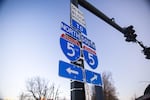Oregon's Transportation Commission met Thursday to hear public input on a proposal for implementing tolls to reduce congestion on Interstates 5 and 205 through Portland.
One key question: whether politicians in Southwest Washington will accept the plan.
An advisory committee has proposed first testing tolling on a portion of Interstate 5 through downtown Portland and on the Abernathy Bridge between Oregon City and West Linn. Under the plan, there would eventually be tolling along both I-5 and I-205 between the state line and their intersection near Tualatin.
The proposal faces stiff opposition north of the Columbia River. In Clark County, roughly half of the population commutes to Oregon for work.
Notably, U.S. Rep. Jaime Herrera Butler has vowed to oppose any proposal that unfairly targets Vancouver commuters.
In Oregon, reception has been more mixed. The Portland City Council has embraced congestion pricing and urged the state Transportation Commission to consider tolling on all of I-205 and I-5 throughout the metro area.
At Thursday's hearing, a number of people shared alternative proposals, including some ideas that might make the proposal go down a little easier in Washington. Here are four interesting ideas.

Interstate 5 runs through the Rose Quarter in Portland, Oregon, Thursday, Dec. 7, 2017.
Bradley W. Parks / OPB
Clearer Benefits For Public Transit
Shawn Donaghy, the chief executive of Clark County’s public transit agency C-Tran, suggested that the congestion pricing plan needs to include clearer benefits for bus service and other forms of transit — and that his agency needs to be part of the conversation.
“Public transportation by its very definition is an example of congestion mitigation and has been for over 100 years,” he said.
C-Tran recently launched the metro area’s first bus rapid transit line, The Vine. The agency is also a major player in Oregon. According to Donaghy, 12-15 percent of its bus service is on routes into Portland.
Donaghy told OPB that, ideally, he’d like to see a dedicated lane for buses included as part of the congestion pricing plan.
Income Tax Deduction For Washingtonians
Washington state Rep. Sharon Wylie, whose legislative district includes downtown Vancouver, supports congestion pricing.
"It’s amazing how quickly people who live in the West forget that almost every bridge that’s been built has been tolled for a while," Wylie said. "I happen to believe it’s inevitable."
She suggested Oregon transportation leaders need to find a way to sweeten the deal and reduce the burden on low-income commuters crossing the river.
“I think a lot of the people I represent would be willing to pay tolls if it helped their commute, and possibly if it was a deduction on their Oregon income tax,” Wylie said.
A London-Style Toll Zone
Several people suggested tolling more freeways or creating an entire toll zone in downtown Portland, among them Milwaukie Mayor Mark Gamba.
“There are a lot of relatively low-pay workers that commute back and forth, particularly through the 205 corridor. Their only option will be to divert onto surface streets,” Gamba said.

Interstate 5 runs through the Rose Quarter in Portland, Oregon, Thursday, Dec. 7, 2017.
Bradley W. Parks / OPB
He encouraged the commission to adopt a system that’s been tested in cities like Singapore and London, where drivers are charged when they enter a particular area at peak times.
“My hope is that the next steps would include a conversation with Portland and with Metro to consider cordon pricing, and a process for using those funds to create a far more robust transit system,” he said.
Test Tolling, But Have A Control Group
John Charles, president of the libertarian-leaning Cascade Policy Institute, proposed running an experiment to see if drivers are wiling to pay for a faster commute: Toll all of I-205 in Oregon and Washington, and leave I-5 untolled. Charles suggested that if people see that pricing can in fact reduce congestion, they might be more inclined to support it politically.
“I think for the people who want an alternative, there’s the answer," Charles said. "I-205 is where we’re going to learn. If you don’t like that, I-5 is unpriced. You can join the scrum there and wait."
